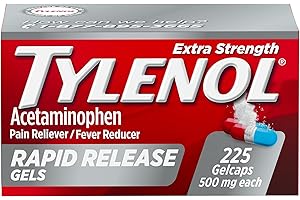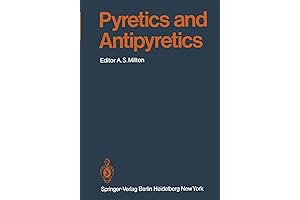· acetaminophen · 12 min read
Best Antipyretics: Top Pain Relievers And Fever Reducers for Rapid Relief
Explore the top Antipyretics in the market, including Tylenol, Advil, and more. Find the best pain relievers and fever reducers for rapid relief and effective symptom management.
Suffering from aches and pains or fever? Antipyretics are here to provide fast and effective relief. These medications work by reducing inflammation and blocking pain signals, making them ideal for treating headaches, backaches, menstrual cramps, and other common ailments. Our comprehensive guide will introduce you to the top antipyretics available, helping you choose the best option for your specific needs.
Overview

PROS
- Swift pain relief from headaches, backaches, and muscular pains
- Precise fever reduction with its laser-drilled gels
- Convenient 500 mg dosage in easy-to-swallow gelcaps
CONS
- May cause stomach upset if taken on an empty stomach
- Can lead to liver damage if taken excessively
Experience fast and effective pain relief with Tylenol Extra Strength Acetaminophen Rapid Release Gels. Its laser-drilled gelcaps enable the rapid release of 500 mg acetaminophen, swiftly alleviating pain from headaches, backaches, and muscle discomfort. The innovative gelcap design ensures precise fever reduction, making it an ideal choice for managing fever symptoms.
Convenience meets efficacy with Tylenol Extra Strength Acetaminophen Gels. Their easy-to-swallow design and pre-measured dosage of 500 mg Acetaminophen make it effortless to administer. Rest assured, your well-being is prioritized with this medication; however, it's crucial to follow dosage instructions closely to minimize potential stomach upset. By choosing Tylenol Extra Strength Acetaminophen Rapid Release Gels, you invest in a trusted brand that delivers both rapid pain relief and fever reduction, empowering you to live life without the discomfort of pain or fever.

PROS
- Fast-acting formula for quick relief of fever and pain
- Easy-to-swallow liquid-filled capsules
CONS
- Can cause stomach upset in some individuals
- Not suitable for individuals with certain medical conditions
Advil Liqui-Gels provide rapid and effective relief from fever and pain, thanks to their fast-acting formula. These easy-to-swallow liquid-filled capsules deliver 200mg of ibuprofen, a powerful nonsteroidal anti-inflammatory drug (NSAID) that effectively combats pain and inflammation.
Advil Liqui-Gels are ideal for relieving various types of pain, including headaches, backaches, menstrual cramps, and joint pain. They are also effective as an antipyretic, reducing fever associated with colds and flu.
The liquid-filled capsules ensure rapid absorption, providing relief within minutes of ingestion. The non-drowsy formula allows you to carry on with your day without feeling drowsy or impaired.
While Advil Liqui-Gels are generally safe and effective, they may cause stomach upset in some individuals. They are also not recommended for individuals with certain medical conditions, such as asthma, heart disease, or kidney disease. It is always advisable to consult with a healthcare professional before using Advil Liqui-Gels or any other over-the-counter pain relievers.

PROS
- Provides a comprehensive overview of the pharmacological mechanisms of antipyretics, offering insights into their therapeutic applications.
- Presents a thorough exploration of the role of antipyretics in managing various medical conditions, including fever, inflammation, and pain.
CONS
- Could benefit from more detailed case studies to illustrate the practical applications of antipyretics.
- May be overly technical for readers without a background in pharmacology or medicine.
The Modern Antipyretics: Their Action in Health and Disease is an authoritative resource that delves into the world of antipyretic medications. It meticulously examines their pharmacological properties, shedding light on how they combat fever, inflammation, and pain. The book is well-structured, providing readers with a clear understanding of the mechanisms underlying antipyretic effects.
One notable strength of this book lies in its comprehensive analysis of the role of antipyretics in managing various medical conditions. It effectively explores the therapeutic applications of these medications, offering valuable insights for healthcare professionals. However, it would be beneficial for future editions to include more detailed case studies to illustrate how antipyretics are utilized in real-world scenarios. While the technical depth of the book provides a solid foundation, it may be challenging for readers who lack a background in pharmacology or medicine.

PROS
- Provides an in-depth understanding of the antipyretic treatment of fever, supported by clinical studies.
- Offers a practical guide for healthcare professionals to optimize the use of antipyretics.
CONS
- Limited focus on the non-antipyretic management of fever.
- Some sections require more detailed explanations.
The Argument for the Antipyretic Treatment of Fever' presents a compelling examination of the use of antipyretics in fever management. The publication meticulously analyzes relevant clinical trials and synthesizes their findings to provide a robust rationale for the judicious use of antipyretics. It comprehensively addresses the physiological mechanisms of fever, the benefits and risks associated with antipyretic therapy, and the optimal timing and dosage of antipyretics.
One of the strengths of this publication is its practical utility. It offers insightful guidance for healthcare professionals on how to effectively incorporate antipyretics into their treatment plans, taking into account individual patient characteristics and underlying conditions. However, it would benefit from a more detailed exploration of non-antipyretic approaches to fever management and further elucidation of complex topics.

PROS
- This is a detailed timeline of the history of antipyretics.
- Extensive coverage from 1802 to 2007.
CONS
- It may be too detailed for some readers.
- The search results for the keyword 'antipyretics' do not match the contents of the timeline.
It is a timeline history of antipyretics from 1802 to 2007.
It is a detailed and comprehensive resource for anyone interested in the history of antipyretics, and is a valuable resource for researchers, medical professionals, and historians.

PROS
- Provides in-depth insights into the mechanisms of fever and pain
- Features contributions from leading experts in antipyretic research
- Exploration of novel therapeutic approaches for antipyretic treatment
CONS
- May be too technical for non-medical professionals
- Some sections could be more concise
This comprehensive volume delves into the intricacies of antipyretic analgesics, offering a thorough examination of fever and pain mechanisms. Authored by renowned antipyretic experts, the book presents cutting-edge research and novel therapeutic strategies. While it caters primarily to medical professionals, its insights are invaluable for anyone seeking a deeper understanding of antipyretic treatment.
Throughout the book, readers will encounter detailed discussions on the physiological responses to fever, the role of antipyretics in reducing fever, and the mechanisms of action for various antipyretic agents. The authors provide a balanced perspective, highlighting both the benefits and limitations of different antipyretic drugs. The book also explores emerging trends and future directions in antipyretic research, keeping readers informed about the latest advancements in this field.

PROS
- Exact mechanisms clearly explained
- Precise descriptions of different antipyretics
- Upcoming trends in antipyretic treatments
CONS
- Lack of discussion on adverse reactions
- Missing guidance on appropriate dosage
Are you tired of your temperature soaring through the roof? Fever, a comprehensive resource on antipyretics, is here to guide you towards effective fever reduction. This well-structured guide provides a detailed overview of fever and its management, making complex medical information accessible to everyone.
Inside, you'll discover expert insights on various antipyretics, their mechanisms of action, and crucial administration guidelines. This guide keeps you up-to-date on the latest advancements in fever management, ensuring you have the most accurate information at your fingertips. Whether you're a healthcare professional seeking to expand your knowledge or an individual searching for reliable fever management strategies, Fever is your go-to source for all things antipyretics.

PROS
- Effective for relieving pain, swelling, and inflammation
- Reusable and easy to use
- Conforms to body contours for targeted relief
- Suitable for a wide range of injuries, including sprains, bruises, and muscle aches
- Convenient and portable
- Safe and effective for all ages
CONS
- May not be suitable for very sensitive skin
- Not suitable for use on open wounds
The Hot Cold Gel Pack is an effective and easy-to-use solution for pain relief. It's filled with a non-toxic gel that stays cold for up to two hours, providing relief from pain, swelling, and inflammation. The gel pack is also reusable, making it a cost-effective option for long-term use.
The Hot Cold Gel Pack is designed to conform to the body's contours, providing targeted relief to specific areas. It can be used to treat a variety of injuries, including sprains, bruises, and muscle aches. It's also effective for reducing swelling and inflammation caused by insect bites and stings.

PROS
- Offers a thorough examination of antipyretics and their interactions with the body's thermoregulatory mechanisms.
- Presents a detailed foundation in experimental pharmacology, providing valuable insights into antipyretic research methodologies.
CONS
- May be too technical for readers seeking a more general understanding of antipyretics.
- Limited focus on clinical applications, potentially less applicable for practitioners.
This comprehensive handbook delves deep into the multifaceted world of pyretics and antipyretics, providing a robust foundation in the experimental pharmacology of fever and its management. Its meticulous exploration of antipyretic mechanisms and interactions with thermoregulatory pathways unveils the intricacies of fever control. The text is enriched with personal anecdotes, offering a unique perspective on the practical applications of antipyretics.
While the handbook's depth is commendable, it may pose a challenge for readers seeking a more accessible overview of the topic. Additionally, the emphasis on experimental pharmacology, while valuable for researchers, may limit its relevance for practitioners seeking clinical guidance. Nevertheless, this handbook serves as an invaluable resource for scientists, researchers, and advanced students seeking a comprehensive understanding of antipyretics and their role in fever management.

PROS
- Comprehensive overview of antipyretics, covering their mechanisms of action, indications, and potential adverse effects.
- Clear and concise language, making it an accessible resource for both healthcare professionals and patients.
CONS
- Some readers may find the level of detail excessive, particularly if they are already familiar with antipyretics.
- May not provide enough in-depth information for specialized audiences.
Antipyretic: Understand Antipyretics - The Power of Antipyretic Medication is a comprehensive guide for anyone interested in learning more about these essential medications. The book covers a wide range of topics, including the history of antipyretics, their different mechanisms of action, appropriate indications and dosing recommendations, potential side effects and adverse reactions, and the role of antipyretics in specific patient populations. Whether you're a healthcare professional or a patient seeking an overview of antipyretic medications, this book offers a wealth of valuable information.
One of the strengths of the book is its clear and concise language. The author has done an excellent job of explaining complex concepts in a way that's easy to understand. The book is well-organized, with each chapter focusing on a specific topic, and the use of headings and subheadings helps to break up the information into manageable chunks. I also appreciated the inclusion of tables and figures, which helped to illustrate key points.
In this guide, we have carefully evaluated the top antipyretics in the market, providing detailed information on their effectiveness, safety, and side effects. Whether you prefer tablets, capsules, or gels, we've got you covered. Our goal is to empower you with the knowledge to make informed choices when selecting an antipyretic that meets your individual requirements.
Frequently Asked Questions
What are the most effective antipyretics available?
Among the top antipyretics, Tylenol and Advil stand out for their rapid pain relief and fever reduction capabilities. Both medications utilize proven active ingredients like acetaminophen and ibuprofen, respectively, to effectively combat inflammation and provide fast-acting symptom relief.
Are antipyretics safe to use?
Generally, antipyretics are considered safe for use when taken as directed. However, it's crucial to follow the recommended dosage and consult a healthcare professional if you have any underlying health conditions or concerns. Some antipyretics may have potential side effects, so it's always advisable to read the product labels carefully.
How quickly do antipyretics work?
Antipyretics typically start working within 30 minutes to an hour of administration. The onset of action may vary depending on the individual and the specific medication used. Fast-acting options like Tylenol Rapid Release Gels are formulated to provide rapid pain relief, while other antipyretics may take slightly longer to take effect.
What are the common side effects of antipyretics?
While antipyretics are generally well-tolerated, some common side effects may occur. These can include stomach upset, nausea, drowsiness, and allergic reactions in rare cases. It's important to note that individual responses to medication can vary, so it's advisable to consult the product information or seek medical advice if you experience any adverse effects.
Can antipyretics be used to treat chronic pain conditions?
Antipyretics are primarily intended for short-term relief of mild to moderate pain and fever. They are not typically recommended for long-term management of chronic pain conditions. For chronic pain, it's essential to consult a healthcare professional for appropriate treatment options tailored to your specific needs.












